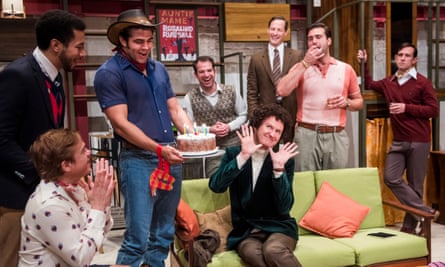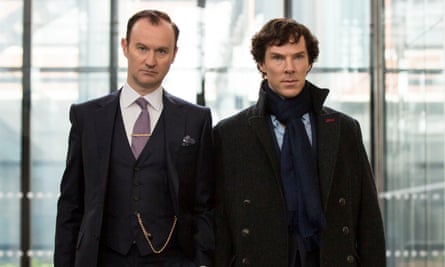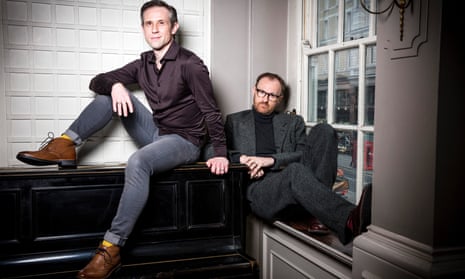Mark Gatiss is telling me how he met his husband. It was 17 years ago and Gatiss was making The League of Gentlemen while Ian Hallard wasn’t long out of drama school. It wasn’t showbiz that brought the pair together, though. They met online, which was not the sort of thing you broadcast back then. “There was a genuine stigma in those days,” says Gatiss, “which has completely vanished now. We didn’t tell our families – I said we’d met at a party or something like that, because it was still a bit odd.”
Not as odd, perhaps, as shouting “Go stick your tweezers in your cheek!” at your husband on a nightly basis, in front of hundreds of people, as Hallard is currently required to do in the play the two are starring in. For the first time, they have been treading the boards together, in Mart Crowley’s The Boys in the Band – a controversial, poignant and hilariously bitchy play about a gay birthday party that goes nuclear.
As seasoned pros, they insist their relationship doesn’t skew their on-stage dynamic, although working together has posed some dog-sitting issues. “He was a proper Andrex puppy,” says Gatiss dreamily, showing me pictures of their pet labrador over tea at London’s Vaudeville theatre, which is about to host a West End run of the 1968 play.

In the show, which has been playing across town at the Park theatre, Hallard’s character Michael is hosting a birthday party for his friend Harold, played by Gatiss, who calls himself an “ugly, pockmarked Jew fairy”. Having been “profoundly affected” by the film version as a teenager, it was only a matter of time before Gatiss would don Harold’s black curly wig, velvet jacket and vampiric persona.
Once the party is in full swing – complete with dance routine and topless cowboy – a straight college friend of Michael’s shows up having just had an unspecified emotional crisis, and is repulsed by one of the very effeminate guests. Soon Michael is cringing as his lifestyle is revealed. As more drink is taken, a fight erupts and Michael bullies everyone into playing a humiliating truth game.
Hallard’s portrayal of Michael has won him a nomination for the What’s On Stage best actor award, which is voted for by the public. Other contenders include Ian McKellen, Ralph Fiennes, Kenneth Branagh and Jamie Parker (star of Harry Potter and the Cursed Child). “Someone tweeted,” says Hallard, “that I was up against four wizards: Gandalf, Voldemort, Professor Lockhart and Potter, so I don’t stand a chance with their combined … ” “Fanbases,” nods Gatiss. “I was going to say magical powers,” says Hallard.
Set in New York, the play was first performed a year before the 1969 Stonewall riots. “These men could have been raided by the police for just being a gathering of gay men,” says Hallard. “Michael,” adds Gatiss, “is obsessed with keeping the downstairs door open, because he doesn’t want them to be caught.”
While The Boys in the Band sold out at the Park theatre last year and then headed out on a national tour, some critics have found the once groundbreaking work dated. But Hallard and Gatiss believe it still resonates. “The perception,” says Gatiss, “can easily be that we have equal age of consent, marriage – so all the victories appear to have been won. But it’s as relevant as ever, in terms of gay people’s mental health and addiction issues.” His character is a stoner and Michael is a terrible drunk trying to stay sober for a night.
Gatiss points out, too, that the Trump era is changing everything. “All these victories are fragile – they can be undone in one signature, so it feels terrifyingly relevant. Everything they’re talking about is still with us.” After one post-performance Q&A session, a young man came up to them and said: “That play’s just me and my friends.”
This isn’t the first project Hallard and Gatiss have worked on together. “We’ve done a bit of Doctor Who,” says Gatiss. They also co-wrote an episode of Poirot, and Hallard is unofficial script editor on everything Gatiss writes. “Often one of us is away filming or on tour,” says Hallard, so working together means “actually spending a bit of time together, which is lovely”. Over Christmas, Hallard was off being Widow Twankey. “I think panto’s brilliant,” he says. “I didn’t come from a theatrical background and it was my first experience of theatre.”

There is the small matter of Sherlock to discuss. Gatiss co-created the hit TV show and plays the sleuth’s brainy brother Mycroft. Recent episodes have divided audiences. Gatiss avoids reviews, but after being shown a Guardian article complaining that Sherlock was turning into James Bond, he took the writer to task in a poem, sending it to the newspaper’s letters page.
“It made me cross,” says Gatiss, “because that guy knows his stuff and he’s selecting the bits which back up his argument. But you can’t say Sherlock Holmes is an intellectual and solves problems from his chair.” Gatiss spent a good three hours on the poem: “I had better things to do, but I thought: ‘I’ll try and do this well.’ I enjoyed it.” And he was pleased with the supportive responses. “It went viral. I had more attention from that than I have from any interview I’ve ever done. It was in the New York Times and Vanity Fair.”
He believes a Sherlock backlash was inevitable – a “familiar pattern” with anything so successful. “We toyed with calling one of the episodes Backlash, because it’s time.” He points out that the third series of The League of Gentlemen, “though now regarded as a classic, was very controversial. A lot of people hated it.”
There hadn’t been any intention to go off piste with Sherlock, he insists. “It goes for any artistic endeavour – all you can do is your best. Sometimes you have to have an unpleasant amount of attention. But I’m stopped in the street two or three times a day by people saying how much they’ve enjoyed it. What more could you want?”

Comments (…)
Sign in or create your Guardian account to join the discussion